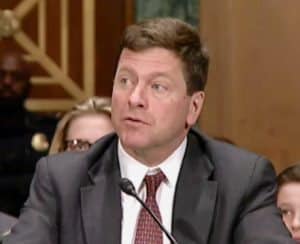 The Chairman of the Securities and Exchange Commission (SEC) Jay Clayton published a request for comments today tackling a controversial topic. Chair Clayton addressed the Department of Labor’s “Fiduciary Rule” that deals with the conduct of investment advisors and broker dealers. It will also impact the growing sector of Robo-Advisors that provide more automated types of financial guidance. These platforms compete with more analog advisors.
The Chairman of the Securities and Exchange Commission (SEC) Jay Clayton published a request for comments today tackling a controversial topic. Chair Clayton addressed the Department of Labor’s “Fiduciary Rule” that deals with the conduct of investment advisors and broker dealers. It will also impact the growing sector of Robo-Advisors that provide more automated types of financial guidance. These platforms compete with more analog advisors.
The controversy stems, in part, due to the fact the Department of Labor may not be the best venue for regulating finance and is arguably outside its domain. But the courts have ruled Labor’s involvement aligns with its mission to protect retirement savings.
Additionally, there has been an ongoing debate as to whether or not the rule will help smaller investors or harm them further.
Superficially, the rule was crafted to require financial advisors to only recommend financial investments that are suitable for the investor. The advisor must act as your fiduciary and look out for you interests instead of someone else’s (like their own). Makes sense, right? Well, maybe.
In the land called reality, all too often well intentioned rules have unintended consequences. Most investment advisors should not need the government telling them they need to provide solid and balanced investment advice. If they gave investors bad advice their business would suffer. But if you raise the bar on the liability for that giving advice, will they want to actually give it? The cost of insurance for advisors will increase as the threat of litigation jumps. Inevitably there will be a far greater number of class action lawsuits as the legal community sees new opportunity to profit from the misfortune of others.
Another scenario is when an advisor has the option of recommending two quite similar funds to an investor. But one of the funds pays the advisor more money. The Fiduciary Rule would in theory compel the advisor to recommend the one that pays them less money as the would be mandated to act in such a manner.
So would the scenario above actually save the investor money?
Perhaps, once again. Advisors may simply offer a far smaller selection of investment options to mitigate the rules. Or, even worse, they may just decide to get out of the business of providing advice to smaller account holders as it costs more to service than it is worth.
President Trump filed an Executive Order directing the DoL to review the Fiduciary Rule in an attempt to kill or delay it. But the previous administration was crafty in cooking this one up and, as WSJ.com explained, it is “difficult for Trump to just kill this by Executive Order … the former administration armored the regulation.”
The US Chamber of Commerce has taken up the battle in behalf of financial advisors. Recently they published a report entitled; “The Data is In: The Fiduciary Rule Will Harm Small Retirement Savers.” Chock full of facts and figures the Chamber went big guns on the rule.
But now the new Chair of the SEC has jumped into his first foray into the Octagon known as Washington, DC.
Clayton stated;
“The Department of Labor’s Fiduciary Rule may have significant effects on retail investors and entities regulated by the SEC. It also may have broader effects on our capital markets. Many of these matters fall within the SEC’s mission of protecting investors; maintaining fair, orderly, and efficient markets; and facilitating capital formation.
I welcome the Department of Labor’s invitation to engage constructively as the Commission moves forward with its examination of the standards of conduct applicable to investment advisers and broker-dealers, and related matters. I believe clarity and consistency — and, in areas overseen by more than one regulatory body, coordination — are key elements of effective oversight and regulation. We should have these elements in mind as we strive to best serve the interests of our nation’s retail investors in this important area.”
With the applicability date for the Fiduciary Rule fast approaching (June 9, 2017), time is of the essence. A webform and e-mail box are now available for members of the public to make their views on the Fiduciary Rule and, for that matter, other items such as Dodd-Frank and the JOBS Act exemptions. Chair Clayton has itemized a series of questions regarding the SEC’s actions on these matter. The entire document is embedded below.
[scribd id=350196838 key=key-QGQO5GJqqtOixjr9MpI6 mode=scroll]

